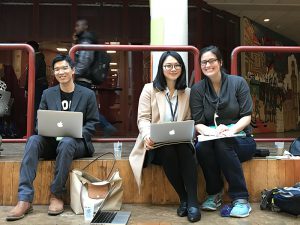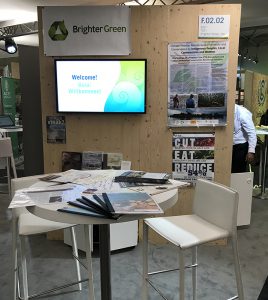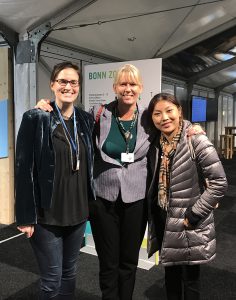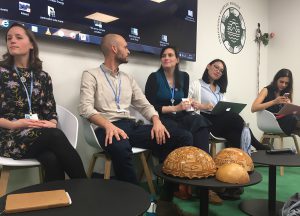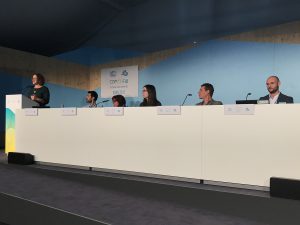
COP23
This year’s Conference of the Parties to the United Nations Framework Convention on Climate Change (COP23 for short) took place on November 6-17, 2017 in Bonn, Germany (the COP was formally hosted by the government of Fiji). Brighter Green participated in a series of events and collaborative initiatives at COP23 with the goal of raising awareness of and laying the groundwork for concrete action on animal agriculture and global warming. During COP we updated our “Good Food China” network via regular posts on WeChat (in Chinese), as well as Brighter Green’s Twitter and Facebook pages. We also shared an exhibit space in the conference center’s Bula Zona to disseminate our research including a new discussion paper by Judy Bankman, titled Chronic Disease, Changing Diets and Sustainability: The Globalization of Western-style Eating and Its Implications, that illuminates the public health and environmental challenges created by the rapid adoption in Africa, Asia, and Latin America of diets high in fats, sugar, processed foods, and salt. We have a press release for why this paper is timely and relevant to the work that needs to be done at COP23, specifically on Agriculture Day on November 10, and the actions that we need to take regarding climate change, agriculture, food systems, and sustainable diets in general.
Conference of Youth (COY)
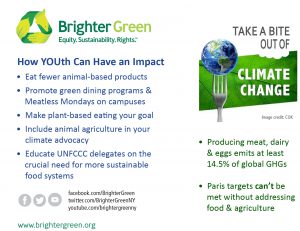 This year, for the first time, Brighter Green attended the Conference of Youth (COY13) which was also held in Bonn on November 2-4. COY is a gathering of international and regional Youth NGOs, civil society actors, and other young climate activists that takes place each year before the COP. This year, delegates came from 114 countries. Brighter Green’s Caroline Wimberly, and Zhu Qing and Xinyi Lin from our “Good Food China” network attended COY and also led a workshop on November 3, titled “What’s Your ‘Steak’ in it? How YOUth Can Promote More Sustainable, Climate-compatible Food & Agricultural Systems.” The presentation was well-received and discussions about the topic continued throughout the weekend and at the COP itself, including at Brighter Green’s exhibit booth. The talk was covered in both English and Italian. You can read the articles in Agenzia di Stampa Giovanile, Youth Press Agency, and Unimondo. We created a handout specifically for COY with actions YOUNGOs and youth climate activists can take on animal agriculture (at right). The workshop at COY has its origins in a class project completed by graduating seniors in New York University’s environmental studies department in a “capstone” course taught by Brighter Green executive director Mia MacDonald.
This year, for the first time, Brighter Green attended the Conference of Youth (COY13) which was also held in Bonn on November 2-4. COY is a gathering of international and regional Youth NGOs, civil society actors, and other young climate activists that takes place each year before the COP. This year, delegates came from 114 countries. Brighter Green’s Caroline Wimberly, and Zhu Qing and Xinyi Lin from our “Good Food China” network attended COY and also led a workshop on November 3, titled “What’s Your ‘Steak’ in it? How YOUth Can Promote More Sustainable, Climate-compatible Food & Agricultural Systems.” The presentation was well-received and discussions about the topic continued throughout the weekend and at the COP itself, including at Brighter Green’s exhibit booth. The talk was covered in both English and Italian. You can read the articles in Agenzia di Stampa Giovanile, Youth Press Agency, and Unimondo. We created a handout specifically for COY with actions YOUNGOs and youth climate activists can take on animal agriculture (at right). The workshop at COY has its origins in a class project completed by graduating seniors in New York University’s environmental studies department in a “capstone” course taught by Brighter Green executive director Mia MacDonald.
COP 23 Meeting and Partnered Side Event
One of our goals for COP23 was to reach out to and connect with groups and individuals working on animal agriculture from multiple sectors, as the scale of the problems demands a diverse alliance. Along with The Johns Hopkins Center for a Livable Future, we organized a strategy meeting at the conference venue with people with various expertise and entry points, including environment, nutrition, soil science, policy, animal welfare, biodiversity, and research. We were pleasantly surprised by the high turnout for the meeting (nearly 30 people), and along with the increased visibility and participation of those working on these issues within and outside of COP, shows how momentum to address animal agriculture and climate change is building.
Li Li, also from the Good Food China network, joined our delegation and spoke at our joint side event on Sunday, November 12. “Livestock, Biosequestration & Forests: Closing the ‘Reality Gap’ in Climate and Land Use Policy and Finance” examined how climate policies in the livestock and forest sectors are not only interrelated but will determine whether the world’s countries forge a 1.5 degree Celsius warming pathway without compromising environmental integrity, food security and human rights. Li Li highlighted the importance of changing food systems in China (away from a Western “model” of high consumption of animal-based foods), the negative impacts of industrialized meat, and our programs on food systems and sustainability (including the Good Food Hero Summit), as well as the growth of veganism in China. You can watch a livestream of the side event here.
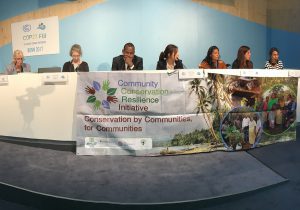
From left to right: Simone Lovera, Doreen Stabinsky, Tesfaye Gonfa, Li Li, Ruth Zenaida Buendia Mestoquiari, Coraina de la Plaza, and Marcela Vecchione.
A roundtable of experts from various regions explored how climate policy and finance can be redirected to address the real drivers of global warming. They included:
- Doreen Stabinsky, for Institute for Agriculture and Trade Policy (IATP), USA
- Tesfaye Gonfa, REDD+ regional manager, Federal Democratic Republic of Ethiopia
- Ruth Zenaida Buendia Mestoquiari, Ashaninka Central of the Ene River, Peru
- Li Li, Good Food Initiative/Brighter Green, China
- Coraina de Ia Plaza, Global Forest Coalition, Spain
- Marcela Vecchione, Grupo do Carta do Belem, Brazil
- Moderated by Simone Lovera, Global Forest Coalition, Paraguay
Click here for a full list of side events related to animal food consumption or sustainable diets more broadly.
Additional Side Events at COP23
Brighter Green was also invited to be a part of a side event on Wednesday, November 15 organized by the Israeli NGO, Green Course, called “Time for a diet shift: Plant based diet for climate change mitigation.” The panelists continued to explore why animal agriculture isn’t discussed in climate change negotiations and what can be done to change this, as well as promoting plant-based diets as a climate action with significant co-benefits. They spoke to an overflowing room, and some of our content was mentioned in this article in the Ecologist.
We also attended a side event called “Reducing Livestock’s Long Shadow” organized by ProVeg International and Green Course. The panel spoke about the opportunities for the livestock sector to play an important role in mitigating global warming and to simultaneously deliver ethical, health and sustainable development co-benefits. They also discussed the importance of animal-to-plant protein shifts and how together with practical policy-based solutions, the livestock sector could help to comply with the Paris Agreement. You can watch a livestream of the side event here (skip to the 14:30 mark).
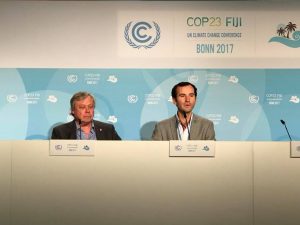
Cornell University Professor Robert Howarth and Mark Pershin of Less Meat Less Heat at the press conference.
In addition, we attended a press conference put on by Less Meat Less Heat where they launched their Put Climate on Pause Coalition that aims to push the UNFCCC to count greenhouse gas emissions with dual term accounting that measures them on a 20-year scale in addition to the current 100-year model, which highlights the impacts of SLCPs (short-lived climate pollutants), including methane and nitrous oxide from agriculture.
We heard some pretty optimistic comments by new UNFCCC Senior Director for Policy and Programme Coordination, Dr. Martin Frick on the potential of agriculture to slow down climate change. He proposed a high-level, focused action day at next year’s COP on agriculture, and highlighted the importance of supporting small farmers, moving on from a focus on sustainability to restoration, and not relying on untested high-tech solution.
 Brighter Green
Brighter Green




